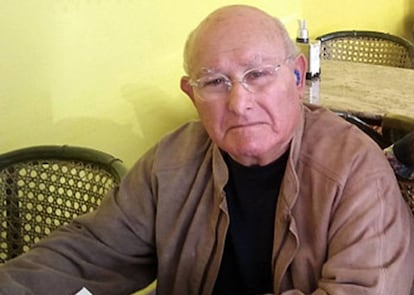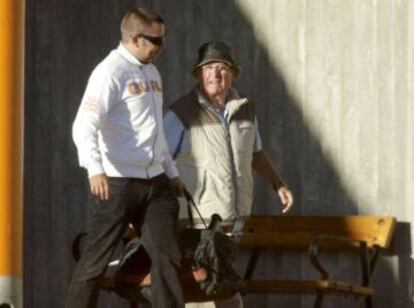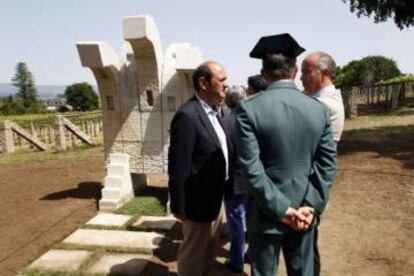Arrest of 85-year-old drug lord confirms return of historical gangs to Galicia
Manuel Charlín and his son Melchor were held as part of a major raid against a cocaine shipment

The arrest on Wednesday of a veteran drug lord from Spain’s northwest Galicia region, the 85-year-old Manuel Charlín Gama, illustrates how drug trafficking in the region continues to thrive despite keeping a lower profile in recent years.
Manuel Charlín Gama and his son Melchor, 57, were two of the main targets in a large-scale drug bust involving a cocaine shipment that was going to be delivered at a spot on the coast of Portugal, according to the police. There were 25 arrests, including many well-known figures of the Galician drug world. Manuel and Melchor are part of the “clan de los Charlines,” a gang whose leader has now been arrested five times in the course of several decades.
Los Charlines became something of a school of crime for other would-be traffickers
In recent years, the familiar sound of the speedboats delivering a shipment at night had practically disappeared from the Rias Baixas estuaries. The drug boats were no longer seen being chased by the police or caught up in skirmishes between rival gangs. But the peace and quiet was just a mirage: the drug-running never disappeared, it just changed scenarios.
Drug trafficking began in Galicia in the early 1980s, and it made a comeback with help from historical gangs like Los Charlines. This is the fifth arrest for the patriarch Manuel, who has been out on parole since 2010. Another veteran leader, Jacinto Santos Viñas, was also held on Wednesday in connection with a shipment of 2.5 tons of cocaine that was intercepted in the middle of the Atlantic Ocean, around 400 nautical miles from Portugal’s Azores islands.
In February of this year, police had nabbed another notorious trafficker, José Ramón Prado Bugallo, better known as “Sito Miñanco,” who was in possession of four tons of cocaine.

The arrests illustrate the return of the old bosses to the Rías Baixas, where they recently deployed the same logistics that served them so well in the past: working without intermediaries, buying directly from the suppliers, taking charge of the shipping from South America, and dropping off the drugs with their own speedboats. “Their return has crowned them once again as number one in terms of cocaine transportation by sea,” said a police official.
Manuel Charlín is the leader of the largest family clan to have emerged in Galicia in the 1970s. The gang has survived through the 20 years its boss spent behind bars, and the seizure of its considerable assets. Being 85 has proven no obstacle to the grandfather of the drug world, who has once again attempted to defy the police.
Manuel and his brother José Luis have a long history of unlawful business activity whose origins go back to tobacco smuggling and small-time heroin distribution. In time, the clan developed a solid infrastructure for cocaine and hashish trafficking, and Los Charlines became something of a school of crime for other would-be traffickers. Working for them was like doing a master’s degree in the drug business, since the Charlines had the best network of contacts in Colombia and Morocco, and worked without intermediaries. Their fleet of ships was the first to cross the Atlantic, operated by the most experienced carriers of the day.

By the late 1980s, the brothers had already incorporated their own children into the family business. But José Luis was arrested in Portugal and Manuel was nabbed during a drug raid known as Operation Nécora, although he was acquitted because the court rejected phone taps as evidence. Meanwhile, two of their ships continued to sail from Panama to Cartagena de Indias in Colombia, where they loaded the cocaine, and back across the ocean to Galicia, where speedboats unloaded it with complete impunity.
At the trial that followed Operation Nécora, the clan’s transportation chief Manuel Baúlo ratted on his bosses and was subsequently shot down in 1994 by hired killers from Colombia. Although Charlín and his daughter Josefa were not convicted of ordering the killing, Baúlo’s testimony did serve to send them to jail over a 600-kilogram cocaine shipment.
Since then, Manuel Charlín, his six children and several of his grandchildren have been hit by a series of legal setbacks, and had most of their assets seized. In 2010 it emerged that the clan had an additional €15 million in Swiss bank accounts and invested in seafood restaurants in China. This new blow to their finances may have played a role in the Charlines’ recent decision to attempt yet another drug operation.
English version by Susana Urra.
Tu suscripción se está usando en otro dispositivo
¿Quieres añadir otro usuario a tu suscripción?
Si continúas leyendo en este dispositivo, no se podrá leer en el otro.
FlechaTu suscripción se está usando en otro dispositivo y solo puedes acceder a EL PAÍS desde un dispositivo a la vez.
Si quieres compartir tu cuenta, cambia tu suscripción a la modalidad Premium, así podrás añadir otro usuario. Cada uno accederá con su propia cuenta de email, lo que os permitirá personalizar vuestra experiencia en EL PAÍS.
¿Tienes una suscripción de empresa? Accede aquí para contratar más cuentas.
En el caso de no saber quién está usando tu cuenta, te recomendamos cambiar tu contraseña aquí.
Si decides continuar compartiendo tu cuenta, este mensaje se mostrará en tu dispositivo y en el de la otra persona que está usando tu cuenta de forma indefinida, afectando a tu experiencia de lectura. Puedes consultar aquí los términos y condiciones de la suscripción digital.








































